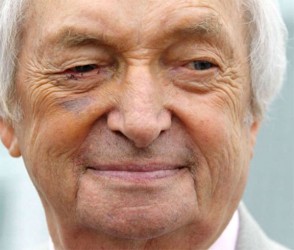SYDNEY, (Reuters) – Former Australia captain Richie Benaud, the celebrated ‘voice of cricket’ in the commentary box, has died at the age of 84 after battling skin cancer.

A giant figure in the game both on and off the field, Benaud died peacefully in his sleep in a Sydney hospice late yesterday, his employer Channel Nine reported, citing family.
“Richie Benaud’s passing has robbed us not only of a national treasure but a lovely man,” Nine Network CEO David Gyngell said in a statement.
“Richie earned the profound and lasting respect of everyone across the world of cricket and beyond. First as an outstanding player and captain, then as an incomparable commentator and through it all, as a wonderful human being.”
Benaud revealed in November he was fighting a skin cancer on his head and his public appearances had become increasingly rare in recent years.
After starting his career as a leg-spinning all-rounder, Benaud never lost a series as captain and led the side to three successive Ashes series victories in the 1950s and 1960s.
He played 63 tests for his country and was the first player to score 2,000 test runs and take 200 test wickets.
A former newspaper journalist, he would then carve out a 40-year career behind the microphone, his measured style and distinctive voice marking him as one of the game’s finest analysts.
Known simply as “Richie” to cricket-lovers world-wide, Benaud would also play an instrumental role in the World Series Cricket revolution.
His recruitment by Australian media tycoon Kerry Packer to call World Series games lent respectability to the breakaway professional circuit which would ultimately change the game.
Tributes poured in from former players, celebrities and politicians.
“There would hardly be an Australian over the last 40 years who hasn’t listened to Richie Benaud,” Australia Prime Minister Tony Abbott told ABC radio, describing him as a very effective cricketer and great personality.
“He certainly will be very, very much missed.” Australia test captain Michael Clarke said it was a “really sad day.”
“I think that’s why he’s such an idol to so many current cricketers because he’s been such a gentlemen on the field, an amazing player, and a lot of current players probably don’t realise how good a player he was,” Clarke told the “Today” show on Channel Nine.




